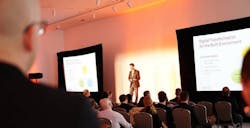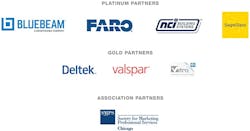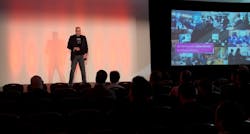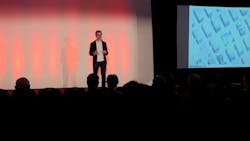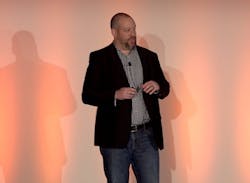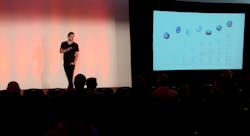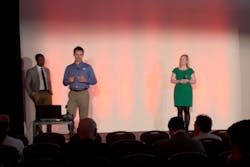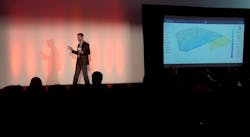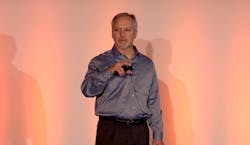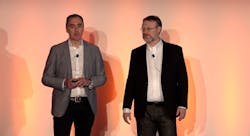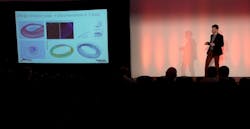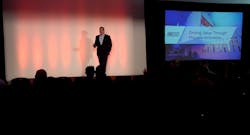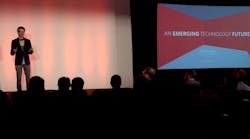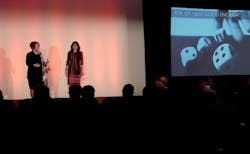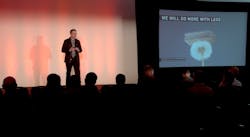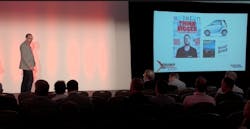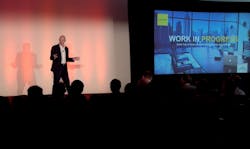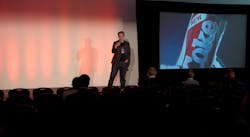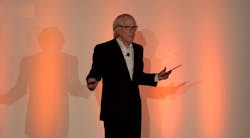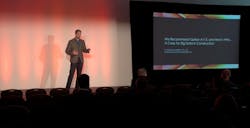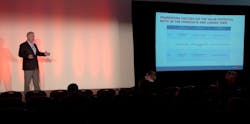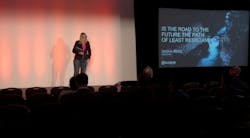More than 140 architects, engineers, and contractors attended BD+C’s inaugural Accelerate Live! innovation conference, May 11 at Venue SIX10 in Chicago. The high-energy forum and networking event featured 20 talks from business and tech leaders from the nation’s largest AEC firms.
Each speaker had 15 minutes and up to 10 slides to present a radical idea, solution, project, or innovation related to the future of the AEC industry or the changing built environment. All 20 talks were live-streamed on BDCnetwork.com and live-tweeted at @BDCnetwork.
Accelerate Live! was sponsored by:
Nathan Miller
Founder, Managing Partner
Proving Ground
We call him the "other Oracle of Omaha.” Hailing from the great state of Nebraska, Nathan Miller has no formal training or education in computer coding—but don’t let that fool you. In short order, Miller has earned wide acclaim as one of the industry’s bright minds and most trusted consultants in the areas of computational design and data-driven design. As Founder and Managing Director of the consulting practice, Proving Ground, he has helped some of the nation’s largest AEC firms overcome challenges in the technology landscape. In this talk, Miller presents his vision of a data-driven future for the business of design, where creativity is fueled by continuous improvement, and solutions are built on proof.
Applying Machine Learning to Building Design (12:04)
Daniel Davis, PhD
Director of Product Research
WeWork
Daniel Davis joins us from New York, but he hails from New Zealand, so don’t dare call him an Aussie! Davis has a PhD in architecture and has spent the better part of the past 4.5 years researching and applying advanced technologies in building design and planning—from the use of sensors to reality capture to artificial intelligence. As Director of Product Research at WeWork, Davis leads a team of researchers that is using a range of computation and machine learning methods to improve WeWork’s co-working office spaces across the globe. In this talk, Davis offers a glimpse into the world at WeWork, and how his team is rethinking the workplace design with the help of machine learning tools.
Gaming Tech in Construction (15:30)
Lucas Richmond
Senior Media Studio Manager
Gilbane Building Company
As the head of Gilbane Building Company's Multimedia Studio, Lucas Richmond is doing things differently when it comes to hiring. He is building a rock star team and solid foundation for future success by recruiting the best of the best in video game design for careers in the construction industry. Focusing on an artistic approach and innovation mindset, Richmond and his team are turning the industry upside down and issuing a new wave of thinking when it comes to traditional hiring practices. Learn more about his unconventional approach and the deliverables produced at Accelerate Live!
The Future of Computational Design (12:25)
Ben Juckes
Associate
Yazdani Studio of CannonDesign
Linguists Edward Sapir and Benjamin Whorf proposed that the structure of a language determines, or at least influences, how we perceive and experience the world. Could this idea of linguistic relativism apply to computer languages as well? At the Yazdani Studio of Cannon Design scripting has become an every-project occurrence and, as a consequence, each designer regularly works with computational tools as part of his or her basic toolset. The frequency and extent of this usage is having a profound effect on the way the studio approaches problem solving as well as the design and documentation process. We will retrace this transformation with three examples of built or in-process projects where computation has helped shape outcomes or enable new possibilities. Some observations on how this immersion has impacted the way we look at documentation and a possible future for project delivery beyond the current BIM model will close out the presentation.
Sponsor Talk: FARO Technologies
3D LASER SCANNING FOR THE PROJECT LIFECYCLE (12:40)
Brent Slawnikowski
Account Manager, Construction BIM-CIM
FARO Technologies, Inc.
Jennifer Suerth, LEED AP
Vice President, Technical Services
Pepper Construction
The Project Lifecycle has become more complex and challenging over the last decade. Logistics planning, schedules, limited working space, coordination of BIM models and so many other factors affect how our projects are completed. Since the introduction of laser scanning to the AEC industry, significant changes have come to the way we handle each stage of the project lifecycle. In this talk, Brent and Jennifer will discuss different ways that 3D laser scanning can be applied throughout the project lifecycle and how implementation of laser scanning technology has helped Pepper Construction become more successful in the completion of their projects.
TRACK #2: AEC BUSINESS INNOVATION
Learning From Silicon Valley: Using SaaS to Automate AEC (13:50)
Sean Parham
VP of Product Marketing and Management
Aditazz
Straight from Silicon Valley, Sean Parham has spent nearly his entire career in the tech and telecom worlds, from Motorola to Cisco to launching his own startups. Last July, he joined the executive team of one of the AEC industry’s hottest tech-focused startups: Aditazz. As VP of Product Marketing and Management, Parham is leading the firm’s charge in shaking up the traditional design and construction approaches. The firm’s goal is to simplify and improve what is an inherently complex and messy process by adapting technologies and methodologies from the semiconductor and software development worlds. In this presentation, Parham takes us through the "Aditazz way” for automating traditional AEC practices.
The ROI of Innovation Culture (15:15)
Russ Sykes, PE, LEED AP
Managing Partner, SVP
SmithGroupJJR
In the 1920s, a Fortune 500 company's lifecycle was 67 years. Today it's 15 years, as disruptive forces and technological advancements displace and create companies/products/services at a record pace. Firms that aren't poised to respond to evolving paradigms will not survive. SmithGroupJJR established a culture that ignites innovation and propels change, even in a disruptive world. Russ Sykes demonstrates how four mantras paved the way for new operational models, idea generation, and process improvements. They include creating a culture of engagement, nurturing "intrapreneurs," and building loyalty with unconventional rewards.
Learning By Making: How Maker Culture is Transforming a Design Practice (16:25)
Pablo Savid-Buteler, LEED AP
Managing Principal
Sasaki
Brad Prestbo, AIA
Senior Associate
Sasaki
Boston-based design and planning firm Sasaki has been at the forefront of the maker movement in the AEC market. We’re not referring to designing maker spaces for their clients, although Sasaki does that, too. We’re talking about applying the principles and practices of the maker movement to the traditional design firm: using hands-on exercises, prototyping, and digital design to help extract the best solutions and ideas from everyone in the organization. Pablo Savid-Buteler and Brad Prestbo talk about how this movement is changing the way Sasaki goes to market, and how it is helping the firm win new business.
Incubating Innovation: R&D and Product Development (16:03)
Jonatan Schumacher
Director of CORE Studio
Thornton Tomasetti
Over the course of the past decade, Thornton Tomasetti has morphed from a firm based on traditional engineering practices, to one centered on innovation through R&D and product development. As Director of the firm’s virtual incubator, CORE Studio, Jonatan Schumacher has helped to spearhead this companywide movement toward innovation. The firm’s inventions range from novel scripts and design tools to its custom TTX database that provides real-time collaboration across a multitude of software tools. Schumacher presents the firm’s business model for developing, incubating, and delivering cutting-edge tools and solutions for the firm, and the greater AEC market.
Sponsor Talk: NCI Building Systems
Driving Value through Process Innovation (9:32)
Jonathan O'Leary
Vice President, Building Solutions
NCI Building Systems
The old way of doing business is becoming increasingly burdensome and expensive for AECs. To drive profitable growth, they must rely on their partners to simplify the business process and minimize risk while serving as a trusted partner and thought leader.
TRACK #3: THE CHANGING BUILT ENVIRONMENT
Preparing for the AI Revolution (15:28)
Alan Robles
Associate, Firmwide Creative Media Leader
Gensler
Alan Robles is not an architect, yet he rose through the ranks to become a leader and trusted innovator within the world’s largest architecture firm. Maybe it’s his beatboxing skills, or his racing talents, or maybe his flair for songwriting. No, we have a feeling it’s because of his creative abilities, especially designing experiential environments for Gensler’s clients. And for his gifts of seeing into the future and exploring how technologies will impact design and the built environment. In this talk, Robles shares how the AEC giant firm is preparing its project teams and clients for the coming artificial intelligence revolution.
Health-generating Buildings (15:10)
Marcene Kinney, AIA, LEED AP
Principal
GBBN Architects
Angela Mazzi, AIA, ACHA, EDAC
Senior Associate
GBBN Architects
During the past 20 years, we’ve witnessed an evolution in building design, from high-performance and energy-efficient buildings, to sustainable and green buildings, and now to spaces that enhance performance and promote wellness and health. In this talk, Marcene Kinney and Angela Mazzi from Cincinnati-based GBBN Architects talk about their work in behavior change and health-generating design. Their predictive outcome modeling helps clients make strategic design investments that enhance user and building performance, while minimizing behaviors that can lead to more negative outcomes, such as injuries, poor health, or mistakes. They also share design hacks pinpointing specific aspects of the built environment that affect behavior, well-being, and performance to help clients get more success out of their spaces.
Next-Gen Materials for the Built Environment (13:56)
Blaine Brownell, AIA, LEED AP
Associate Professor, Director of Graduate Studies
University of Minnesota School of Architecture
Virtually every revolution in architecture has been preceded by a revolution in materials: think iron, glass, steel, concrete, plastics, and composites. What is the next revolutionary material that will reshape the very nature of architecture? A solid that's lighter than air? Metal latticework so delicate it rests on a dandelion? Self-generating microbial glue that repairs cracks in concrete? Blaine Brownell, author of the Transmaterial series, reveals emerging trends and applications that are transforming the technological capacity, environmental performance, and design potential of architecture in Transmaterial Next.
The World's Smartest Buildings (12:07)
Derik Eckhardt, AIA
The Miller Hull Partnership
In the burgeoning area of smart and connected buildings, you’d be hard pressed to find an AEC professional who knows more about the newest and most-advanced projects than architect Derik Eckhardt. Last summer, Eckhardt traveled the globe to research and study the world’s smartest buildings, under a scholarship from AIA Seattle. Abu Dhabi, Amsterdam, Copenhagen, Dubai, London, and Stuttgart were among his destinations. Consider Eckhardt the Anthony Bourdain of smart buildings. Eckhardt shares what he learned during his recent travels, and attempts to answer the question: What makes a building “smart”?
Sponsor Talk: SageGlass
Work In Progress: How The Office Environment Drives Innovation (16:25)
Dr. Alan McLenaghan
CEO
SageGlass
Workplaces that spur innovation challenge the conventions of the traditional office environment. They're designed to benefit the health and wellbeing of team members, above all us. During this presentation, SageGlass CEO Dr. Alan McLenaghan reviews how biophilic design and new technologies, such as dynamic glass, create a greater connection between the built and natural environments in the office. He details how this connection can enhance the creativity, cognitive thought, and productivity of team members—ultimately creating the foundation for innovation.
TRACK #4: PROJECT + PROCESS INNOVATION
Manufacturing the Future of Construction: From Job Site to Factory (15:23)
Tyler Goss
Global Innovation Development Manager
Turner Construction
From prefabrication to predictive visual-data analytics. From RFID tagging to the use of drones and rovers on job site. Turner Construction has been at the forefront of smart job site movement. And the construction giant is just getting started. Through these measures and others, like Lean management and advanced BIM/VDC coordination, Turner has set an ambitious goal to transform the complex and messy process of commercial construction into a predictable—and therefore improvable—industrial process. In this talk, Tyler Goss, Turner’s Global Innovation Development Manager, presents the company’s “job site as a factory” initiative.
Finding the Money For Your Clients' Projects (15:05)
Paul Westlake, FAIA
Global Culture+Performing Arts Leader, Senior Principal
DLR Group | Westlake Reed Leskosky
As everyone in the AEC industry knows all too well, without money for a building project, there is no building project. During his decades-long career in architecture, Paul Westlake has become somewhat of a master for helping his clients—particularly in the cultural and performing arts sectors—find money for their projects. In some cases, these projects would not have happened without Westlake’s expertise. In other cases, he helped his clients fully realize their vision, with added funding for optional programming. Westlake shares some of his methods for adding value to projects on the financing end. These include tax credit equity financing, preservation tax incentives, and new markets tax credits.
A Case for Big Data in Construction (14:20)
Graham Cranston, PE, SE
Senior Structural Engineer
Simpson Gumpertz & Heger
Our projects today are creating and using more data, from more sources, and across more disciplines, than ever before. From the Internet of Things, to swarms of sensors, to point clouds, to reality capture—we are drowning in data. Graham Cranston shares SGH’s efforts to take hold of its project data. This includes applying mathematical optimization techniques to leverage the Big Data generated by parametric analysis and presenting it all in an information-rich interactive visual graphics.
Scaling change in a changing industry (15:21)
Chris Mayer
Chief Innovation Officer
Suffolk Construction
In the GC community, Suffolk Construction was one of the first to not only recognize the potential of emerging technologies, like drones and reality capture, but to establish a formal process for vetting these tools. The firm established R&D teams across the organization to pilot technologies on actual projects. If the desired results were achieved, the team would then evaluate the scalability across the organization. It all sounds so simple, right? Well it’s not. Chris Mayer, Suffolk’s Chief Innovation Officer, presents the company’s proven framework for scaling change in a rapidly changing industry.
Sponsor Talk: Bluebeam, Inc.
Is the road to the future the path of least resistance? (18:30)
Sasha Reed
VP of Strategic Development
Bluebeam, Inc.
The path of least resistance often leads you to the right destination, IF you focus on solving the right problems. But how can we be sure that todays "solution" isn't just a set up for tomorrow's headache? It's the innovator's dilemma. Do we evolve bit by bit over time by sustaining the benefits of experience, or do we adopt entirely new models and practice responsible, disruptive innovation? With the industry's need to generate efficiencies strong than ever, Sasha Reed, Bluebeam VP of Strategic Development, introduces the models and methods necessary to make the right changes to addresses the real challenges on your specific job site. Construction will not change unless we start responsibly breaking things. Interoperability is no longer a buzzword. Integrations are the new reality. Learn how to give your teams the permission to responsibly break things and create ecosystems of people, process and technology to truly evolve our industry.
